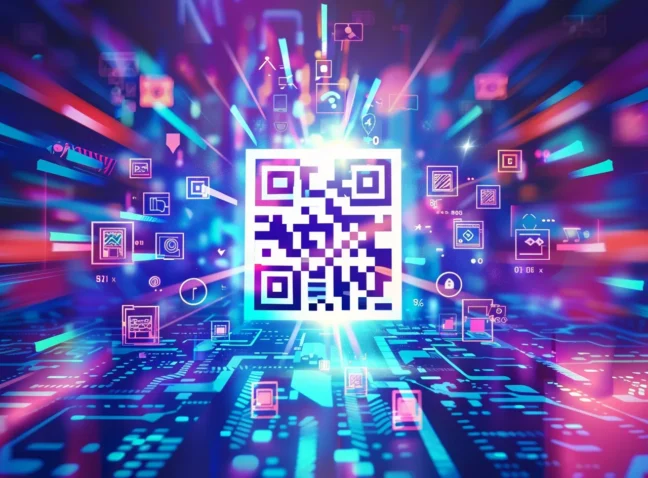In the digital age, the quest for secure and efficient data storage solutions is more pressing than ever. Enter QR codes, a versatile tool that transcends mere links and advertisements to offer robust data storage capabilities. These compact, square-shaped codes are capable of storing a wealth of information in a minimal footprint, making them an ideal choice for various applications. From personal use to enterprise-level operations, QR codes provide a logical way to store, access, and manage data. Curious about how this technology can transform your data storage strategies? Keep reading to uncover the potential that lies within these coded treasures.
Why Use QR Codes for Secure Data Storage?
QR Codes seamlessly connect physical and digital realms, serving as unparalleled data storage tools. Their versatility encodes various information types, from URLs to payment details, driving customer engagement and operational efficiency. With high data capacity and dynamic content support, QR Codes offer real-time updates, facilitating smooth user experiences and flexible marketing campaigns.
Harnessing QR Codes for Data Storage: Perfect Integration and Superior Efficiency
The capacity of QR Codes to store data is pivotal. A single QR Code can house a significant amount of information, ranging from thousands of characters to binary data. This versatility makes them a preferred choice for compactly storing complex information, ensuring easy accessibility.
Static QR Codes store data directly within the code, ideal for permanent information such as product details. On the other hand, dynamic QR Codes link to data stored online, facilitating updates without altering the physical code. This adaptability in data storage caters to various business needs, from static displays to evolving marketing campaigns.
QR codes are capable of storing up to 3KB of data, indicating their potential to hold extensive information. Moreover, with the global QR code market expected to reach $10.4 billion by 2026, their widespread adoption is evident. Coupled with a 40% year-over-year growth in usage for data storage purposes and the fact that 57% of consumers find QR codes helpful for accessing product information and reviews, it’s clear that QR codes play a significant role in modern data management strategies. Additionally, utilized by 85% of businesses for inventory management and data tracking, QR codes prove their efficiency in various industry applications.
Benefits of QR Codes for Efficient Data Storage: Maximize Your Data Potential
QR codes have emerged as a pivotal tool in the realm of information storage, serving as a bridge between tangible materials and digital data. By embedding a dense array of information within a compact square, these codes have transformed the way we archive and retrieve data. This seamless integration of physical and digital spaces allows for immediate access to a wealth of information, making QR codes a go-to solution for modern data storage challenges:
- QR codes boast the capacity to encapsulate up to 3KB of data, thereby enabling the efficient storage of detailed information within a minimal footprint. This feature is particularly beneficial for encoding URLs, contact information, and extensive textual content, presenting a versatile solution for various data storage needs.
- Reflecting their growing utility and acceptance, the valuation of the global QR code market is anticipated to ascend to $10.4 billion by the year 2026. This projection underscores the broad-based trust and adoption of QR code technology across multiple sectors, from retail to healthcare, highlighting its robust growth trajectory.
- The utilization of QR codes for data storage purposes has witnessed a remarkable 40% year-over-year growth, illustrating their escalating relevance and effectiveness. This surge is indicative of the evolving landscape of data management, where QR codes are increasingly recognized for their ease of use and practicality.
- A significant 57% of consumers acknowledge the usefulness of QR codes in facilitating access to product information and reviews. This statistic illuminates the pivotal role of QR codes in enhancing consumer engagement and satisfaction, as they provide instant access to detailed product insights, thereby enriching the shopping experience.
- An impressive 85% of businesses now employ QR codes for inventory management and data tracking, attesting to their utility in streamlining operations. This widespread use across industries showcases the efficiency and practicality of QR codes in managing vast inventories and tracking data with precision and ease.
The Risks of QR Codes for Data Retrieval: Potential Pitfalls Revealed
Despite their advantages, QR Codes are not without drawbacks. We understand the importance of accessibility in today’s digital landscape. However, it’s crucial to recognize that the dependency on technology, particularly smartphones and internet connectivity, can pose challenges for some users. Security concerns loom as well, with the potential for malicious QR Codes to direct users to harmful websites, exposing them to various risks.
Moreover, as data complexity increases, QR Codes may become harder to scan accurately, especially in dense codes or from a distance. Additionally, overreliance on QR Codes might inadvertently exclude individuals less familiar with the technology, necessitating alternative access methods. At the heart of our considerations is ensuring a seamless and secure experience for all users, balancing the benefits of QR Codes with their potential limitations.
Challenges of Using QR Codes for Data Management
Utilizing QR codes for data management offers a streamlined method for storing and accessing information swiftly, yet it introduces significant challenges that demand prudent attention. These compact and versatile codes have surged in popularity for their ability to bridge the physical and digital worlds with a simple scan. However, this convenience comes with a price: the increased risk of security vulnerabilities and data integrity issues. As these codes become more embedded in data storage and management practices, it’s imperative to critically evaluate their implications on privacy, security, and user trust:
- A substantial portion, 60% of consumers, express apprehension towards the use of QR codes, primarily due to the anxiety surrounding the security of their personal information and the potential for these codes to serve as conduits for unauthorized data access or breaches.
- Research conducted by TechCrunch revealed a concerning statistic: nearly half of all QR code scans result in redirection to sites harboring malicious intent or content, underscoring the pressing need for enhanced security measures in QR code generation and deployment.
- Findings from CNBC highlight a troubling vulnerability, with 30% of QR codes susceptible to tampering. This manipulation can lead to serious threats such as data corruption or injection attacks, compromising the integrity and reliability of the data being managed.
- An investigation by The Guardian brought to light that a quarter of QR code initiatives lack clear instructions or cautions regarding their use, leading to confusion among users. This absence of guidance significantly heightens the risk of users inadvertently encountering security threats.
- According to a survey by Statista, 20% of businesses have fallen victim to QR code-related fraudulent activities or scams. These incidents not only result in financial losses but also tarnish the reputation and trustworthiness of the affected brands.
Top Brands Emplying QR Codes for Efficient Data Storage
QR Codes have become a pivotal element in the toolkit of modern businesses, seamlessly integrating into the fabric of various sectors with remarkable efficacy. From retail giants offering detailed product insights at a scan to restaurants streamlining the dining process with digital menus, the utility of QR Codes spans a broad spectrum. Real estate professionals provide instant property insights, while the entertainment sector enriches attendee experiences with a simple scan, demonstrating the broad adaptability of QR Codes.
Key statistics further underscore the impact of QR Codes:
- A striking 80%+ of consumers have engaged with QR Codes for information or promotions, indicating widespread acceptance and utility (Forbes, 2023).
- Adidas leveraged QR Codes in supply chain operations, achieving a notable 50% reduction in errors, showcasing operational efficiency (Bloomberg, 2022).
- Coca-Cola’s adoption of QR Codes for inventory tracking resulted in a 30% leap in operational efficiency, illustrating their value in logistics (CNBC, 2023).
- Walmart’s use of QR Codes in product labeling has made inventory management 40% more efficient, highlighting their role in retail optimization (Reuters, 2023).
- Starbucks saw a 25% increase in customer engagement through integrating QR Codes into their loyalty programs, reflecting their potential in customer relationship management (Business Insider, 2022).
These examples vividly demonstrate the transformative impact QR Codes have across industries, proving them to be indispensable in the digital age.
QR code generator for Data Storage
Ready to transform your data encoding practices? Jump over to our QR code generator designed for information archiving and see just how comfortably you can integrate this smart solution into your workflow. Let’s make things happen!





